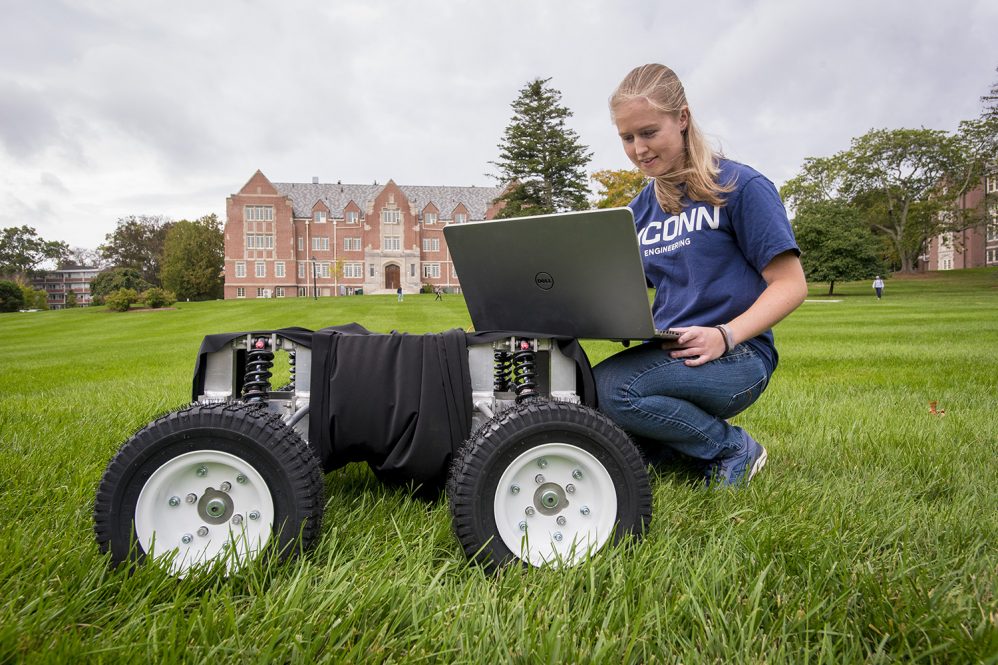The University of Connecticut has joined the National Science Foundation I-Corps Hub Northeast Region, a prestigious appointment that will allow the university to serve more entrepreneurs seeking to develop scientific and technological innovations.
The I-Corps Hub Northeast Region is a coalition of universities that provides programs to help faculty, researchers, and graduate students develop tech and scientific discoveries into businesses that can benefit society. UConn will be in a division with Yale, Princeton, and eight other colleges.
“The School of Business welcomes this opportunity to expand entrepreneurial development in such compelling areas,’’ said Dean John A. Elliott. “The innovations from the scientific community offer profoundly important medical, health, and societal benefits, while new technology produces access to exciting and vital tools for almost every avenue of life.’’
“One of the things we do exceptionally well at UConn is to guide entrepreneurs on their journey to success, and I’m pleased that we will now be able to serve even more aspiring business leaders,’’ he said.
The I-Corps program, housed in the Connecticut Center for Entrepreneurship & Innovation (CCEI), offers training, mentoring, and resources to startup hopefuls. Initially, teams attend a four-session program to identify whether their innovation meets consumer needs. After finishing the course, those teams may apply to attend NSF’s more advanced programs and receive a $50,000 small-business funding grant.
“We are excited to grow the Hub’s capacity to nurture the next generation of innovators and business leaders in collaboration with UConn and its ecosystem,’’ said Rodney Priestley, co-director of the I-Corps Hub Northeast Region and the Dean of the Graduate School at Princeton University. “This expansion will bring I-Corps training to greater numbers of researchers, including individuals traditionally underrepresented in entrepreneurship, who are making discoveries in healthcare, materials, energy, and many other areas that are critical for our future.’’
The NSF launched I-Corps to develop and nurture a national innovation ecosystem that builds upon fundamental research to facilitate the application of scientific discoveries closer to the development of technologies, products, and processes that benefit society.
In 2014, UConn was among the first universities to be identified as a partner in that effort, which soon led to the creation of Accelerate UConn, a program that supports entrepreneurs and serves as UConn’s NSF I-Corps site. Some 200 startup teams have graduated from that program. With this new Northeast Hub affiliation, UConn has the resources to mentor scientific and technology innovation and commercialization both locally and across the Northeast.
Jennifer Mathieu, the executive director of the CCEI, a part of the School of Business, noted that CCEI has had tremendous success in supporting new entrepreneurs through the I-Corps programming over the last nine years.
“CCEI has created a substantial infrastructure for new venture development and an environment in which these teams receiving I-Corps training have clear next-step opportunities post program,’’ she said. “We know that this new partnership will allow us to support more entrepreneurs and provide them with additional opportunities for success. This is a truly exciting and significant development for our entrepreneurs, and for those who will benefit from their ideas.’’
Caroline Dealy, a professor at UConn Health, agrees.
“As a UConn faculty member and founder of a tech startup myself, I found UConn’s I-Corps program, Accelerate UConn, invaluable for moving my technology forward,’’ she said. “Now, as faculty liaison for the program, I’m committed to sharing its benefits with others at UConn, so they can learn how best to advance their own technologies to the benefit of health and society through commercialization.’’
In addition to UConn, Princeton and Yale, the Northeast the hub includes Rutgers University, University of Delaware, Delaware State University, Lehigh University, the New Jersey Institute of Technology, Rowan University, Temple University and Drexel University.
If you are interested in learning more about the NSF I-Corps Program at UConn, or joining an upcoming cohort, please contact Jennifer Mathieu at jennifer@uconn.edu or Alycia Chrosniak at alycia.chrosniak@uconn.edu or visit ccei.uconn.edu/accelerate-uconn.



